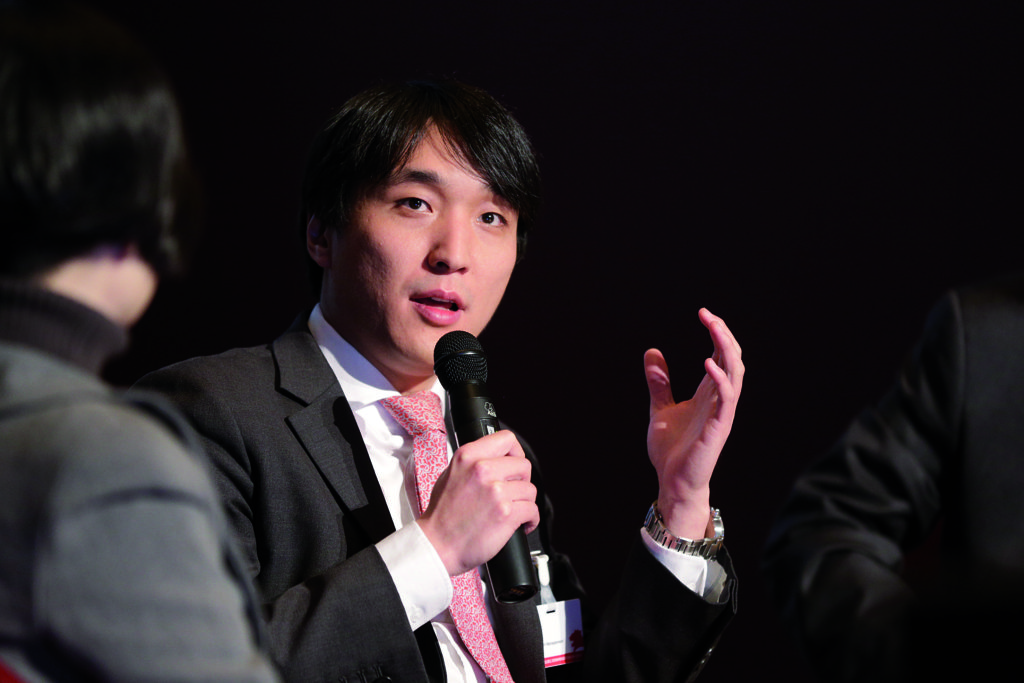More than ever, China’s markets are opening up to foreign players. We talked to some of the leading asset managers worldwide to know more on the importance of China to their business and on what makes Luxembourg a leading domicile when it comes to international funds investing in China.
AN EMERGING MARKET TOO BIG TO IGNORE
“We strongly believe in the future prospects of China. Our ongoing investments in the country reflect our long-term commitment to one of the largest, fastest-growing and most exciting markets in the world,” notes Jon Griffin, CEO of the Luxembourg branch of the US asset manager J.P. Morgan.

Jon Griffin, CEO, J.P. Morgan Luxembourg
Extraordinary growth has been transforming China’s economy into a major middle-class income economy in the last two decades. Liberalisation of the country’s domestic capital markets over the past few years has provided an unprecedented opportunity for international investors to participate through local investment in Asia’s largest economy and to invest in the Chinese onshore market through a growing range of access points including the QFII and RQFII scheme, CIBM, and Connect programs.

Our ongoing investments in the country reflect our long-term commitment to one of the largest, fastest-growing and most exciting markets in the world.
“China is the second largest global economy and one of the largest and fastest growing bond markets globally with over USD 12 trillion of issued debt. The market is becoming too large for investors to ignore,” adds Griffin for whom China represents one the largest opportunities for many of the asset manager’s clients and a critical component of its growth plans, globally and in Asia.
“We have a long-standing presence in Greater China and onshore, both in our business operations and in our investment strategies offered to international clients through our Luxembourg-domiciled UCITS range.”
More than USD 2 billion in Greater China Equities are currently managed across its Luxembourg domiciled SICAV range, as of March 2019.

Johan Schreuder, Luxembourg Managing Director, Investec Asset Management
The Chinese market has a number of attractive characteristics. It is both broad and liquid. The A-share market contained more stocks which had over USD 10 million of daily liquidity than all other emerging markets combined at the end of 2017.
While the country’s expanding middle-class is both supporting and demanding an increasingly sophisticated set of consumers, the power of domestic brands is increasing, making China home to quality companies offering high earnings and cash flow growth opportunities.

The A-share market is rich with opportunities for investors focused on companies demonstrating improving profitability, return on capital, capital discipline and valuations.
“The A-share market is rich with opportunities for investors focused on companies demonstrating improving profitability, return on capital, capital discipline and valuations,” notes Johan Schreuder, Luxembourg Managing Director of Investec Asset Management, a global asset manager that has been at the forefront of UCITS managers providing investors access to the Chinese market through a broad variety of onshore access schemes across both equity and fixed income.
“The globalisation of the Renminbi and growing maturity of the Chinese fixed income market offers a significant opportunity for investors looking to allocate long term capital,” he adds.
ACCESS TO THE CHINESE CAPITAL MARKET THROUGH INVESTMENT QUOTAS
China started to open up its capital markets to the outside world in 2002 by setting up the Qualified Foreign Institutional Investor (QFII) program for international investors, allowing on a selective basis, global institutional investors to invest in its RMB-denominated capital market and beyond traded securities.

Stefano Chao, General Manager, AZ Investment Management
The approved quota by the State Administration of Foreign Exchanges (SAFE) has continuously been increasing since 2004, indicating a larger demand for investment funds with allocations in Chinese assets.
Azimut Holding, Italy’s largest independent asset manager, has been the first and only Italian independent asset manager company to be granted a QFII licence by the local regulators.

Azimut was one of the first asset managers in Europe to offer investment funds dedicated to invest in RMB fixed income assets and is currently still one of the largest in its class.
“Azimut was one of the first asset managers in Europe to offer investment funds dedicated to invest in RMB fixed income assets and is currently still one of the largest in its class,” notes Stefano Chao, General Manager of AZ Investment Management in Shanghai, for which China represents significant opportunities.
In 2011, the second wave of capital markets’ openings came with the RQFII program, the yuan-denominated sibling of QFII. It was aimed at widening investment channels for overseas yuan funds on the Chinese mainland, allowing qualified investors to invest yuan-based funds raised in Hong Kong and in other markets in the mainland securities market within a permitted quota.

Stock Connect Programs can help managers to increase their exposure to these markets without an RQFII license and quota.
Investec Asset Management was one of the first asset managers to receive an RQFII licence from the CSRC in 2014 and was then allocated its first RQFII investment quota in 2015.
“These licences and quotas allowed us to build upon our strong investment track record on the Asian continent, by accessing the mainland Chinese equity and bond markets directly across our existing global and regional products, including within our flagship Luxembourg-domiciled UCITS range of daily dealing funds,” notes Johan Schreuder.

Marco Zwick, Director, CSSF
ADVANTAGES OF SETTING UP AN RQFII FUND IN LUXEMBOURG
Luxembourg was the first European jurisdiction to authorise the use of an RQFII quota in the context of a UCITS fund back in 2013. Two years later, the People’s Bank of China granted Luxembourg a 50 billion RMB RQFII quota, confirming the country’s role as a major Renminbi hub.
ICBC (Europe) is one of the Chinese asset managers that has opted for Luxembourg as a location for the launch of their inter-national investment fund platform and that has laid the foundations for its international development in Luxembourg UCITS. In December 2014, the asset manager launched an RQFII UCITS fund enabling it to tap the European investment fund industry through its European arm. It also marked the first of its kind that could invest up to 100% of its assets into CIBM as a regulated market by Luxembourg-domiciled UCITS funds.

UCITS funds can invest up to 100% of their net assets in China A-shares, giving investors in such UCITS funds unparalleled access to the A share market.
“UCITS funds can invest up to 100% of their net assets in China A-shares, giving investors in such UCITS funds unparalleled access to the A share market,” explains Bing Li, Managing Director, Product Innovation & Management at ICBC Asset Management (Global) in Hong Kong.
“Setting up an RQFII fund in Luxembourg will not only benefit the fund promoter from the attractive legal framework and friendly business environment,it will also facilitate the fund to access the EU market through Luxembourg as the gateway and distribute around the world based on the reputation of Luxembourg UCITS recognised by local regulators and investors,” he adds.

Using the structure of a UCITS undertaking to offer new investment opportunities to a broad spectrum of investors is a natural consequence as the UCTS brand is recognised by retail and professional investors worldwide.
THE HONG KONG CONNECTION
The Stock Connect programs mark a significant milestone towards capital market opening and offer an alternative to QFII and RQFII, allowing foreign institutional and retail investors direct and efficient access to China’s A-shares by trading securities in the Chinese market through the trading and clearing facilities of their home exchange. Initiated by the Hong Kong Stock Exchange and the Shanghai Stock Exchange in November 2014, it was later extended to the Schenzhen Stock Exchange in late 2016 and is today one of the main China A-share access schemes among asset managers around the world.

Using the structure of a UCITS undertaking to o er new investment opportunities to a broad spectrum of investors is a natural consequence as the UCITS brand is recognised and sought by retail as well as professional investors worldwide.
In 2014, Luxembourg’s financial regulator, the CSSF, made a pioneering move in granting the first authorisation allowing a Luxembourg UCITS to trade through Stock Connect. This opportunity was quickly grasped by the industry.
Harnessing its experience gained first from QFII and RQFII, Investec Asset Management started investing in the Chinese equity market through the Shanghai–Hong Kong Stock Connect in January 2015 via funds within its Luxembourg-domiciled UCITS fund range, becoming the first ever global asset manager to receive approval for this.
“The Connect programmes have often provided investors the simplest and fastest way to access the onshore opportunity and eliminated the need to deal with specialised service providers,” notes Johan Schreuder.

For the first time, it enables foreign investors to trade in China’s interbank bond market through Hong Kong accounts under a streamlined process.
UCITS has been key for Investec.
“The UCITS regime provides investors with further comfort that they are investing in a diversified portfolio of eligible assets and this is no less the case than when investing in China than any other global market,” he adds. “Stock Connect programme is particularly useful to access the A-shares listed on Shanghai and Shenzhen exchanges. It can help managers to increase their exposure to these markets without an RQFII license and quota,” says Jon Griffin.
For Bing Li, the main advantage is the time to market. “For the first time, it enables foreign investors to trade in China’s interbank bond market through Hong Kong accounts under a streamlined process rather than taking months to open an onshore account under CIBM direct investment scheme.”

It allows the front office and traders to just use their existing TradeWeb account to access the Chinese interbank bond market.
ICBC adopted the Bond connect scheme for investments into the Chinese Inter-bank Bond Market (CIBM) on the first day when the Bond Connect scheme was available to the market in 2017. As for Luxembourg, the regulator CSSF accepts since 2018 investments via Bond Connect as one of the alternative investment channels for UCITS.
“It allows the front office and traders to just use their existing TradeWeb account to access the Chinese interbank bond market,” adds Jon Griffin.
HOW WILL MUTUAL RECOGNITION FIT INTO THE RANGE OF SCHEMES
With approximatively fifty Luxembourg umbrella funds and a total of almost one thousand sub-funds currently distributed in Hong Kong, the Luxembourg and Hong Kong fund investment sectors are already well and truly connected. The signing of the Mutual Recognition of Funds agreement between the CSSF and the Hong Kong SFC in January of this year is a key step in further improving cross-border distribution of retail funds to the public in the two jurisdictions.
“It opens a new channel for foreign asset management firms, enabling Hong Kong-domiciled funds and Luxembourg UCITS funds to be distributed to retail investors in their respective markets after a streamlined mutual retail fund recognition process,” explains Marco Zwick.
“Both jurisdictions have committed to fast track standard applications from eligible funds. Processing and authorizing applications from eligible funds in a more efficient and streamlined manner, will create new opportunities for fund management companies,” he adds.

UCITS funds can go through a streamlined authorisation process in many jurisdictions worldwide. For example, a UCITS fund domiciled in Luxembourg can get a ast-track access in 1-2 months to the Hong Kong market thanks to the Mutual Recognition f Funds between the two countries.
With Hong Kong being the gateway to China, the new MRF program provides opportunities to Luxembourg based fund management companies willing to access a market of, beside others, high net-worth investors.
COMBINING SCHEMES TO MAXIMISE VALUE
Despite the growing popularity of the Connect programmes, Johan Schreuder believes holding an RQFII quota still has merit.
“It gives access to a broader range of securities, and we retain access to A-shares through the RQFII scheme in our Luxembourg UCITS fund range. Our dealers are able to trade as long as it is a trading day in the PRC whereas under Stock Connect, dealers can only trade on Eligible Stock Connect PRC A-shares when both the Hong Kong and China markets are open for trading. And the RQFII scheme is not subject to the overall daily trading limit, which applies to all investors under Stock Connect.”

UCITS funds can go through a streamlined authorisation process in many jurisdictions worldwide.
The same applies to J.P. Morgan for which a large number of its Luxembourg UCITS funds has access to the market either via Stock Connect, Bond Connect and CIBM Direct. As to whether a deeper opening is to be expected in the future, Azimut foresees a further opening of existing schemes rather than new access points.
“We don’t believe there will be new China access schemes in the future as the current existing ones largely meet foreign investors’ requirements but do foresee further relaxation of existing schemes to expend their investable universe, such as allowing foreign investors to purchase ETFs through the Stock Connect or allowing foreign investors to purchase private funds through QFII,” explains Stefano Chao.
INCLUSION OF A-SHARES IN INTERNATIONAL INDICES
While A-shares is the second largest equity market worldwide with a market capitalisation of approximately USD 7.8 trillion, foreign ownership is still estimated at just 3%. For Johan Schreuder, this is likely to change in the coming years as global index providers gradually include A-shares in regional and global benchmarks.
For Johan Schreuder, this is likely to change in the coming years as global in-dex providers gradually include A-shares in regional and global benchmarks. “Increasing foreign investors’ participation should help reduce market volatility and im-prove price discovery in the A-share market.”

